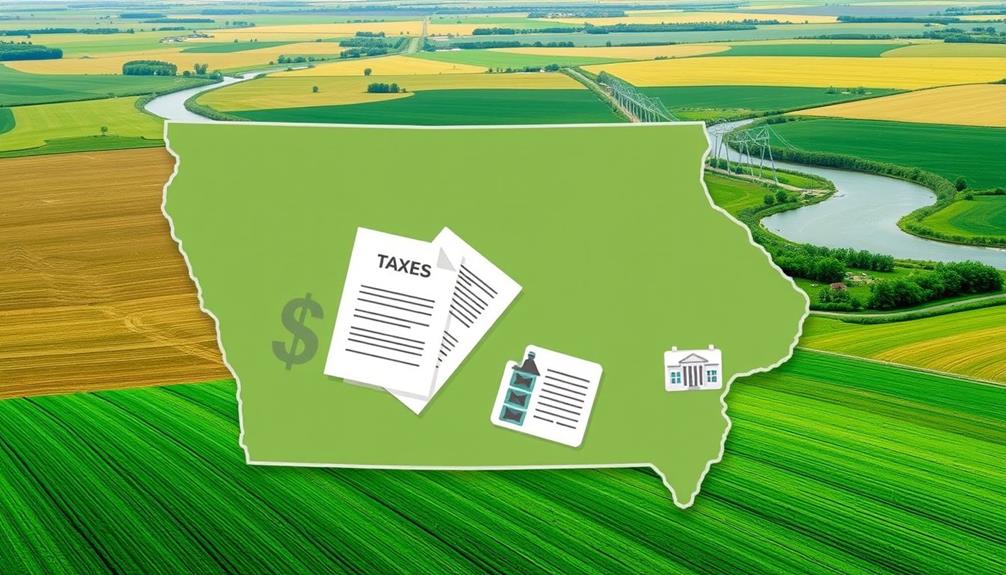If you are currently in Iowa and thinking about making IRA withdrawals, you are in a fortunate position. Starting in 2023, individuals who are 55 years old or older are not required to pay state income tax on their IRA distributions. This allows you to keep more of your savings for retirement. Furthermore, no withholding tax will be applied to these tax-free withdrawals. It is important to note that both spouses must meet the age requirement in order to fully benefit from this exemption. Having a good understanding of these tax implications is crucial when it comes to making wise financial decisions. Keep researching to uncover more strategies and insights specifically designed for your retirement planning in Iowa.
Key Takeaways
- Starting tax year 2023, Iowa exempts IRA withdrawals from state income tax for individuals aged 55 and older.
- Social Security benefits are also exempt from state income taxes in Iowa.
- Proper reporting of IRA withdrawals on income tax returns is essential to avoid tax liabilities.
- Non-taxable distributions for qualifying individuals do not require Iowa income tax withholding starting January 1, 2023.
- Surviving spouses can qualify for tax exemptions based on the deceased spouse's eligibility status.
Overview of Iowa Tax Policies

Steering through Iowa's tax policies can greatly influence your retirement planning. Iowa offers significant tax relief for retirees, especially regarding retirement income. For instance, all Social Security benefits are exempt from state income taxes, providing a financial boost to many.
Starting in tax year 2023, individuals aged 55 and older won't face state taxes on distributions from 401(k)s, IRAs, pensions, and annuities, further enhancing your retirement income. Public pension income is also fully exempt from state taxation in Iowa, which benefits a large number of retirees.
While the state's income tax rates vary, the maximum rate is currently 5.7%, set to drop to a flat 3.8% by 2026. This change could mean more money in your pocket during retirement.
Don't forget about property taxes, which average 1.49% in Iowa. Homeowners aged 65 and older can access additional exemptions, helping you keep more of your hard-earned money.
Understanding these tax policies will empower you to make informed decisions that align with your retirement goals, ensuring you maximize your income while minimizing tax burdens.
Tax Treatment of IRA Withdrawals

Understanding the tax treatment of IRA withdrawals is vital for maximizing your retirement income in Iowa. Starting in the tax year 2023, Iowa offers an exemption for taxpayers 55 and older, meaning your IRA withdrawals won't be subject to state income tax. This change considerably enhances financial security for retirees, allowing you to keep more of your hard-earned savings.
However, it's important to mention that private pension and 401(k) withdrawals remain taxable for those under 55.
As you plan your retirement income, remember that effective state income tax rates for retirees can currently reach up to 5.7%, though this rate is set to decrease to a flat 3.8% by 2026.
To fully benefit from the retirement income exclusion, you must confirm that you correctly report IRA withdrawals on your Iowa income tax return.
Eligibility for Retirement Income Exemptions

To qualify for retirement income exemptions in Iowa, you need to meet specific age criteria or certain disability conditions.
If you're 55 or older by the end of the tax year, or if you're disabled, you can take advantage of the exemption.
Additionally, spousal eligibility plays a vital role, especially for surviving spouses and married couples.
Age Requirement Criteria
Reaching the age of 55 by December 31 of the tax year is vital for qualifying for retirement income exemptions in Iowa, including IRA withdrawals. If you're 55 or older, you can benefit from these exemptions, which apply to various retirement accounts like IRAs, 401(k)s, and pensions. This means you could potentially avoid Iowa income tax on qualifying retirement income, providing significant financial relief.
Disabled individuals are also eligible for the same retirement income exemptions, ensuring they can access their funds without tax burdens.
If you're a married couple, both spouses must meet the age requirement to fully benefit from the exemption. This provides an opportunity for potential full exclusion of all eligible retirement income, maximizing your tax savings.
Surviving spouses can qualify for the exemption based on their deceased spouse's eligibility status at the time of passing.
It's important to keep these age requirements in mind when planning your withdrawals. By understanding these criteria, you can make informed decisions about your retirement income and take full advantage of the exemptions available in Iowa.
Disability Considerations
Disability status opens the door to retirement income exemptions in Iowa, regardless of age. If you or your spouse are disabled, you can qualify for tax exemptions on eligible retirement income, including IRA withdrawals. Here's what you need to know:
- Eligibility: Anyone with a disability can qualify for the retirement income exclusion.
- Age Doesn't Matter: You don't have to be 55 or older to benefit from these tax exemptions.
- Surviving Spouses: If you're a surviving spouse, you may receive the same tax treatment as your deceased partner, based on their disability status.
- Broad Applicability: The exemption covers various sources of retirement income, such as distributions from IRAs and pension plans.
In Iowa, if one spouse meets the age or disability criteria, all eligible retirement income can be excluded from state taxation.
This means you can optimize your retirement finances, ensuring you keep more of your hard-earned money.
Understanding how disability impacts your retirement income tax situation can lead to significant savings, so be sure to explore your options thoroughly.
Spousal Eligibility Conditions
While understanding spousal eligibility conditions for retirement income exemptions in Iowa, it's important to know that only qualifying spouses of retirees aged 55 and older can take advantage of these tax benefits starting in tax year 2023.
This means that if you're a qualifying spouse, you can exclude eligible retirement income from state taxes, including IRA distributions, pensions, and annuities.
To qualify, you must meet the age requirement of 55 years or older by December 31 of the tax year. Alternatively, you might be eligible if you qualify due to disability.
For married couples, if both spouses meet the age requirement, all eligible retirement income can be exempted from state taxes, making it a significant advantage for many.
Additionally, surviving spouses can also qualify for the retirement income tax exemption based on the deceased spouse's age and eligibility status.
This provides a safety net for those left behind, ensuring they can benefit from the same tax reliefs. Understanding these spousal eligibility conditions is vital for maximizing your retirement income benefits in Iowa.
Types of Qualifying Retirement Income

Understanding the types of qualifying retirement income is essential for retirees maneuvering state tax implications. In Iowa, knowing what constitutes qualifying retirement income can help you take full advantage of the retirement income exclusion, especially if you're aged 55 and older.
This is particularly important as common financial terms can impact your planning. Here's a list of what qualifies:
- Distributions from IRAs – Withdrawals from your traditional or Roth IRAs can be exempt.
- Pensions – Income from employer-sponsored pension plans is a key source of qualifying retirement income.
- 401(k) Plans – Distributions from your 401(k) plans also fall under this category.
- Annuities & Governmental Pension Plans – These income sources are included for the exemption as well.
Starting in tax year 2023, all retirement income is exempt from state income tax for residents aged 55 and older.
This means that not only will your pensions and 401(k) distributions be tax-free, but any Roth conversions will also qualify, allowing for tax-free distributions.
Just verify your income meets the criteria set out in Treasury Regulation section 1.401-1(b)(1)(i) to benefit fully from these provisions.
Withholding Tax Requirements Explained

When it comes to IRA withdrawals, understanding withholding tax requirements is essential for your financial planning.
In Iowa, you won't face income tax withholding on non-taxable distributions if you're 55 or older.
However, if you're a non-qualifying payee, it's important to know that a 5% tax will be withheld, so let's break down the withholding process together.
Non-Taxable Distribution Rules
Non-taxable distributions from retirement accounts, such as IRAs and 401(k)s, can greatly ease your tax burden, especially for eligible individuals in Iowa.
If you're a taxpayer aged 55 and older, you'll want to familiarize yourself with the following non-taxable distribution rules:
- Exemption from withholding: Starting in the tax year 2023, distributions from IRAs, pensions, and annuities are exempt from Iowa income tax for qualifying individuals.
- No withholding required: You won't need to worry about withholding Iowa income tax on non-taxable retirement income distributions, simplifying your withdrawals.
- Plan administrators' role: They must withhold Iowa tax at a rate of 5% for non-qualifying payees, ensuring compliance with withholding requirements.
- Refund process: If taxes are erroneously withheld, you can request refunds by contacting your plan administrators and may need to submit a new IA W-4P for future exemption.
This understanding helps you effectively manage your Iowa taxable income and plan for a more comfortable retirement without undue tax burdens.
Withholding Process for Distributions
The withholding process for distributions from retirement accounts can be straightforward if you know the rules. In Iowa, plan administrators must withhold Iowa income tax at a rate of 5% for non-qualifying payees receiving distributions from retirement accounts like IRAs and 401(k)s.
However, starting January 1, 2023, taxpayers aged 55 and older can enjoy tax exemptions for non-taxable retirement income distributions, meaning no withholding is necessary.
To guarantee you benefit from these exemptions, it's vital to communicate your eligibility to your plan administrators. If you believe tax has been erroneously withheld from your retirement distributions, promptly contact your plan administrator for a refund. You may need to submit a new Iowa W-4P form to claim exemption from future withholdings.
Withholding requirements are clarified under Senate File 181, which safeguards qualified distributions from being subjected to Iowa income tax withholding.
Addressing Withholding Errors

Withholding errors can be frustrating, especially if you feel your retirement income's been incorrectly taxed in Iowa. If you suspect an issue, here are steps to take:
- Contact Your Plan Administrator: Reach out to them to report the withholding error and initiate the refund process.
- Submit an IA W-4P: If you need to claim an exemption from future withholding, send a new IA W-4P form to your plan administrator.
- Report Incorrect Withholdings: Any incorrectly withheld amounts need to be included on your Iowa income tax return for potential refunds in the following tax year.
- Understand Repayment Procedures: Plan administrators must repay any overwithheld amounts by the end of the calendar year, either through direct refunds or adjustments to future distributions.
The Iowa Department of Revenue has specific guidelines and tables to help plan administrators calculate withholding accurately.
By taking these actions, you can address any withholding errors effectively and guarantee your retirement income is taxed correctly, allowing you to receive any refunds owed.
Don't hesitate to advocate for your financial well-being!
Comparison With Neighboring States

Understanding how Iowa's tax policies on IRA withdrawals stack up against neighboring states can help you make informed financial decisions.
Iowa stands out positively for retirees, as it exempts all retirement income, including IRA withdrawals, for residents aged 55 and older. In contrast, neighboring states like Illinois and Indiana impose state income tax on these distributions, with rates of 4.95% and 3.23%, respectively.
Nebraska offers a partial exemption, allowing a $60,000 exclusion for those aged 67 and older, while Minnesota's personal income tax on IRA withdrawals ranges from 5.35% to 9.85%. This makes Iowa's full exemption more attractive for retirees.
Meanwhile, Wisconsin taxes IRA distributions at rates up to 7.65%, further highlighting Iowa's favorable environment.
On the other hand, South Dakota and Florida don't have a state income tax, meaning all IRA withdrawals are tax-free. While Iowa's exemption is beneficial, these states provide a unique advantage for retirees.
Financial Planning Strategies

Maximizing your retirement income involves strategic financial planning, especially when it comes to IRA withdrawals. With Iowa's retirement income exemptions starting in 2023, you can effectively reduce your state tax liabilities.
Here are some effective financial planning strategies to evaluate:
- Engage a Financial Advisor: Partnering with a professional can help you optimize your withdrawal strategies, ensuring you minimize tax impacts while maximizing income.
- Utilize Roth Conversions: Converting traditional IRA assets to a Roth IRA can qualify you for retirement income exemptions, enhancing tax efficiency on future withdrawals.
- Diversify Income Sources: Incorporate tax-advantaged accounts and taxable investments in your portfolio to manage overall tax liabilities associated with IRA withdrawals.
- Review Tax Strategies Regularly: Stay updated on changes in Iowa income tax rates and other laws, adjusting your financial planning accordingly.
Resources for Iowa Retirees

As you enter retirement in Iowa, numerous resources can help you navigate your financial landscape effectively. Iowa's tax policies provide significant benefits, particularly for retirees. Starting in tax years beginning in 2023, all retirement income, including IRA withdrawals, is exempt from Iowa income tax for residents aged 55 and older. This means you can enjoy your retirement income without worrying about state income taxes.
Additionally, Iowa exempts all Social Security income from state income taxes, offering you further financial relief if you rely on these benefits.
When it comes to property, be aware of the Homestead Tax Exemption, which can provide property tax relief worth $6,500 for claimants aged 65 and older, lowering your effective property tax rate.
The median property tax bill in Iowa is approximately $2,522, which is lower than the national median, making it more manageable for retirees on fixed incomes.
Furthermore, while local sales tax rates can add up to 2% on top of the state rate of 6%, essential items like groceries and prescription drugs remain exempt, enhancing affordability in your retirement years.
Frequently Asked Questions
Are IRA Withdrawals Taxable in Iowa?
Yes, IRA withdrawals are taxable in Iowa, especially for those under 55. If you're over 55, you might qualify for exemptions. Always check your specific situation to confirm you're aware of any tax implications.
Do You Pay State Income Tax on IRA Withdrawals?
You might pay state income tax on IRA withdrawals, depending on your age and state laws. Check current regulations to see if any exemptions apply to you, especially if you're 55 or older.
Is There Inheritance Tax on IRA in Iowa?
Oh, the joy of inheriting money only to be greeted by taxes! In Iowa, you'll face inheritance tax on IRAs, but don't worry—it's phasing out by 2025. You might escape the worst of it!
What Is the Tax Break for Seniors in Iowa?
In Iowa, if you're 55 or older, you won't pay state income tax on most retirement income, including IRAs. This tax break helps enhance your financial security and promotes stability in retirement.
Conclusion
Maneuvering Iowa's tax landscape for IRA withdrawals can feel a bit intimidating, but understanding the nuances can make a significant difference. By familiarizing yourself with exemptions and the intricacies of withholding requirements, you can guarantee your retirement savings remain intact. Remember, a little foresight in financial planning can go a long way in securing your golden years. Embrace these strategies, and you'll find yourself better positioned for a fulfilling and financially sound retirement.









